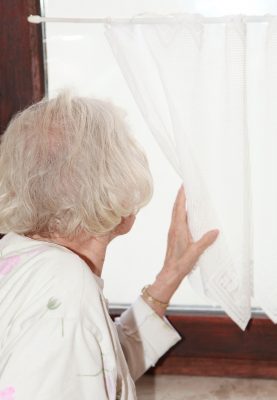 In the past, I assumed that people living in long term care were most vulnerable to feeling lonely. But a situation that arose at a Compassionate Touch workshop taught me otherwise. We were at a large, upscale retirement community. Some lived in beautiful three bedroom houses. We typically worked with people in skilled care. But this particular day, we visited people who lived independently. Therefore I was concerned the training attendees wouldn’t have the desired experience. One participant returned from her visit, visibly shaken. She reported that the woman she visited had a beautiful home and was well-dressed, but she seemed extremely isolated, lonely, and depressed. We can’t assume that because an elder still lives “independently” that they are engaged with other people or lead meaningful lives.
In the past, I assumed that people living in long term care were most vulnerable to feeling lonely. But a situation that arose at a Compassionate Touch workshop taught me otherwise. We were at a large, upscale retirement community. Some lived in beautiful three bedroom houses. We typically worked with people in skilled care. But this particular day, we visited people who lived independently. Therefore I was concerned the training attendees wouldn’t have the desired experience. One participant returned from her visit, visibly shaken. She reported that the woman she visited had a beautiful home and was well-dressed, but she seemed extremely isolated, lonely, and depressed. We can’t assume that because an elder still lives “independently” that they are engaged with other people or lead meaningful lives.
The University of California San Francisco completed a study that confirms that loneliness in older adults leads to more rapid physical and mental decline and even death. According to the study, “The lonely seniors had a 59 percent greater risk of suffering a decline in function, which was defined as being less mobile or less able to take care of daily activities like bathing.”
I often hear isolation and loneliness used together. What’s the difference? Isolation is simply having little contact with other people. It’s an objective measure of the quantity of interaction. Loneliness is a subjective experience. Lonely people feel distressed by lacking the desired companionship. The key is feeling distressed. Research from the National Institute on Aging suggests that simply living alone doesn’t always lead to loneliness. The experience is quite individual. Some people live alone but lead satisfying lives, while others have others around them, but still, feel lonely.
Seniors living in their own homes may suffer most from isolation. Our society does not foster the idea of caring for our older neighbors. Families today scatter across the country. Lots of older people look forward to doctor’s visits because it’s the highlight of their week.
We will all be older. Maybe we can create some goodwill that will be paid forward to us if we pay attention to our elder neighbors now. We don’t have to look far to visit an elder in need of companionship.
Ann Catlin, OTR, LMT: For twenty years, Ann led in the field of skilled touch in eldercare and hospice. She has nearly forty years’ clinical experience as an occupational and massage therapist. She created Age-u-cate’s Compassionate Touch program and serves as a Master Trainer and training consultant.
Loneliness can be overwhelming especially while aging and its impacts especially “death” blows my mind all over the wall. Something everyone must ponder upon.